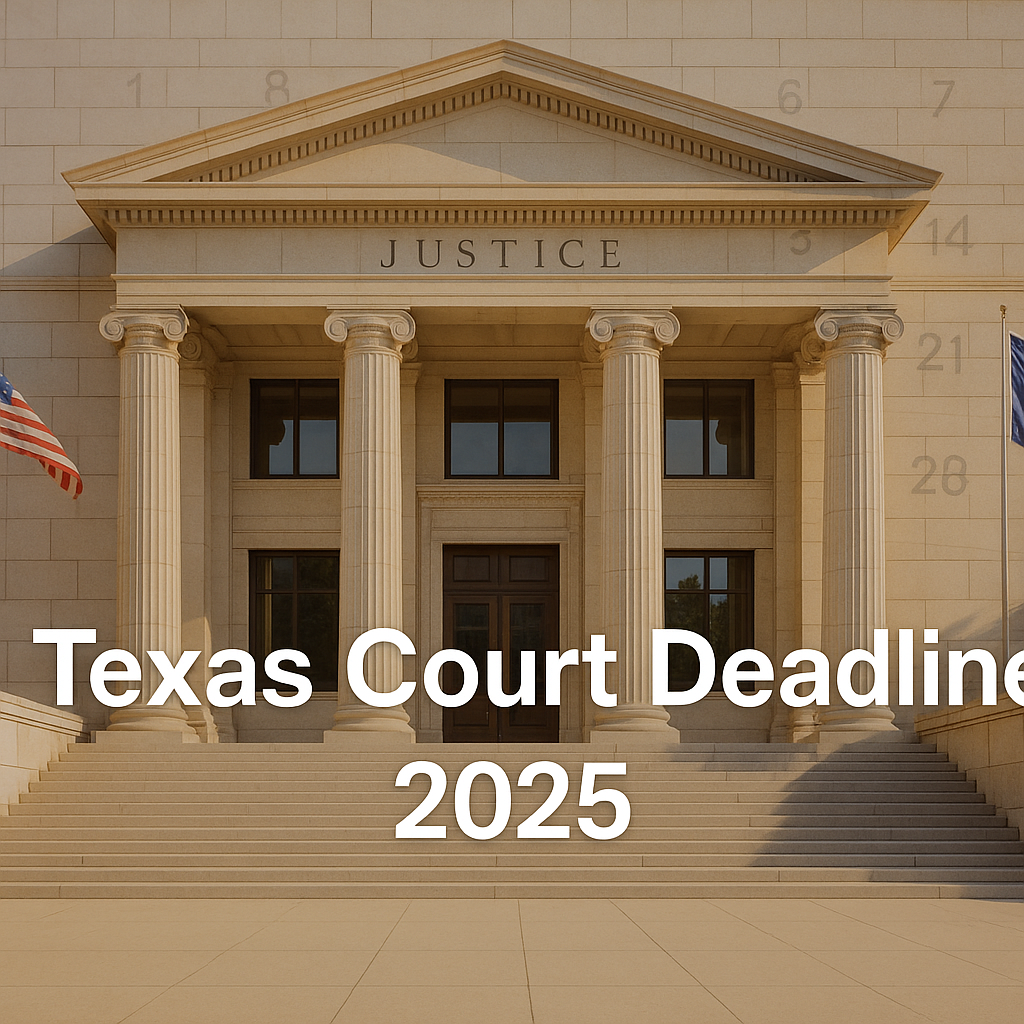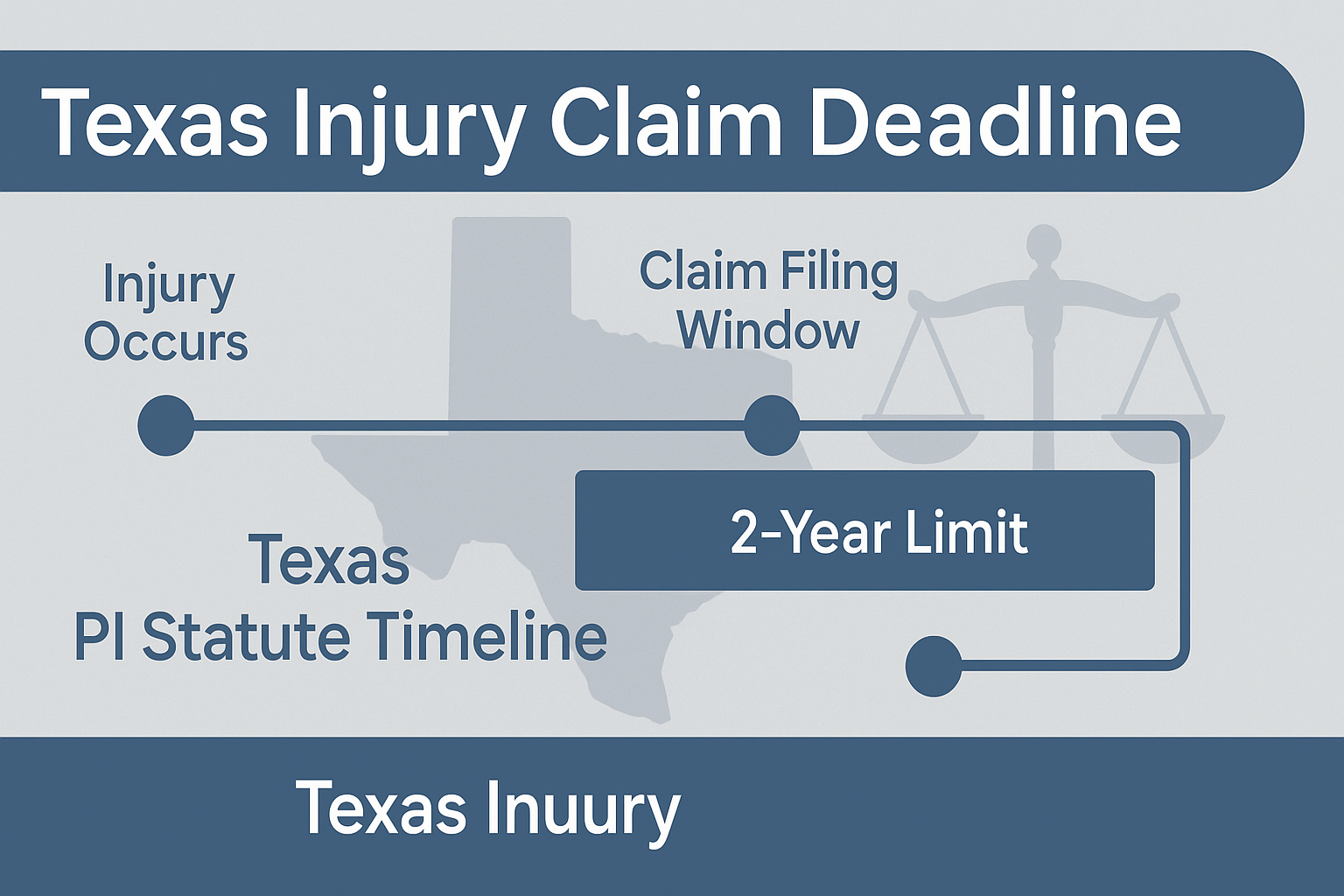Texas Personal-Injury Statute (2025): Filing Deadlines & Tolling
In Texas, most personal-injury lawsuits must be filed within 2 years of accrual. Limited tolling can extend deadlines for minors, persons of unsound mind, certain absences, or specific claim types. Government claims also carry short notice windows. Getting timing right protects your rights and negotiation leverage. (Tex. Civ. Prac. & Rem. Code §16.003; §16.001)

Standard deadlines
Unless a specific statute controls, Texas sets a two-year limitation for personal injury and wrongful death. Accrual is typically the date of injury (or death). Some claim types have different rules (e.g., product-liability repose, special sexual-assault periods). (§16.003; §16.012; §16.0045)
| Claim Type | Principal Deadline | Citations / Notes |
|---|---|---|
| General personal injury | 2 years from accrual | §16.003(a) |
| Wrongful death | 2 years from date of death | §16.003(b) |
| Product liability (repose) | Generally 15-year repose from sale | §16.012 |
| Sexual assault (adult) | 5 years | §16.0045(b) |
| Sexual assault/abuse of child | Up to 30 years | §16.0045(a) |
| Health-care liability (med mal) | 2 years + 75-day tolling after pre-suit notice | §74.051(c) |
| Claims vs. government (TTCA) | 6-month notice (often shorter by charter) + 2-year suit | §101.101 |
Tolling basics
- Disability (minors/unsound mind): Limitations tolled while disability exists; clock starts when it ends (e.g., turns 18). (§16.001)
- Defendant absent from Texas: Tolling while defendant is out of state, subject to defenses. (§16.063)
- Health-care notice: Serving compliant 60-day pre-suit notice tolls 75 days (defects can void tolling). (§74.051(c))
- Discovery rule: Narrow, fact-specific; applies only when injury is inherently undiscoverable and objectively verifiable.

Govt claims
When the defendant is a governmental unit, provide timely notice that describes the damage/injury and when/where/how it occurred—generally within 6 months, though many cities require shorter notice by charter. Actual notice can sometimes satisfy the statute. (Tex. Tort Claims Act §101.101)
Evidence preservation
- Send preservation letters for incident reports, maintenance logs, and video.
- Capture high-quality photos of hazards, injuries, and property damage.
- Secure medical records and a clear causation opinion tying injury to the event.
Demand timing
Many Texas PI cases settle pre-suit. Insurers expect liability theory, medical proof, bills/records, wage loss, and, where appropriate, a policy-limits demand under the Stowers doctrine. Time demands so you can still file—negotiations do not stop the clock.
Counsel tips
- Diary every critical date: injury, TTCA notice, med-mal notice, predicted tolling end, and file-by deadline.
- Confirm defendants early (entity names, registered agents)—late additions risk limitations fights.
- If med-mal is possible, serve §74.051 notice early and verify authorizations to secure 75-day tolling.
- For minors, calculate when §16.001 disability ends; weigh evidence loss while waiting.
Frequently Asked Questions
Missed deadline? What are the options?
If the two-year period has run, claims are typically barred unless a tolling rule applies (e.g., minority, unsound mind, qualifying absence) or a specific statute provides more time. Government-claim notice defects can also be fatal. See §16.001, §16.063, and §101.101.
Discovery rule—does it help?
Texas applies the discovery rule only in narrow categories where the injury is inherently undiscoverable and objectively verifiable. Do not rely on it unless supported by binding precedent for your claim type.
Can I settle without filing suit?
Yes—many claims resolve pre-suit with a comprehensive demand. But settlement talks don’t toll limitations. File on time or obtain a written tolling agreement. Health-care claims require 60-day notice with 75-day tolling. §74.051.
Key Takeaways
- Default PI filing deadline in Texas is 2 years; confirm any special statutes or repose.
- Tolling exists but is limited—minors/unsound mind, some absences, medical-claim notice (75 days), narrow discovery-rule cases.
- Government-defendant cases add a short notice requirement (often ≤6 months) and still need timely suit.
- Negotiations don’t pause deadlines; evidence and leverage improve when you act early.
References